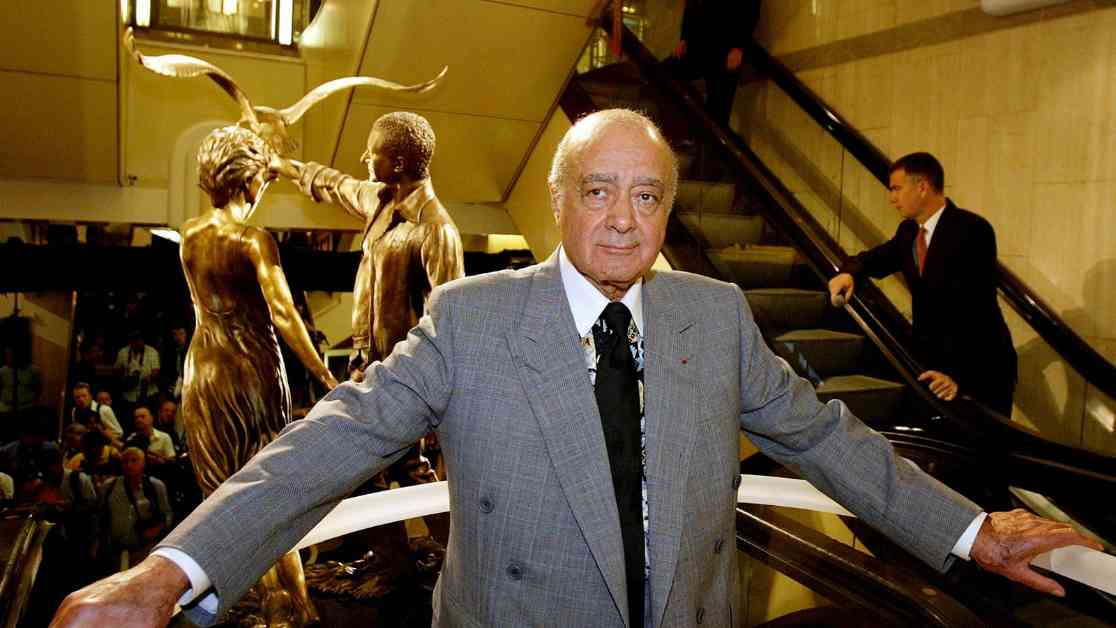Former Harrods Director Sheds Light on Toxic Culture: Mohamed al Fayed’s Leadership Exposed
A former Harrods director has come forward with shocking revelations about the toxic culture at the prestigious department store under the leadership of Mohamed al Fayed. In an interview with Sky News, the ex-director expressed disbelief that security at Harrods could have been unaware of Fayed’s inappropriate behavior towards women. The late Fayed, who passed away last year at the age of 94, has been accused of rape by five women, with several others alleging sexual misconduct.
Security Concerns and Surveillance Measures
The former director, who chose to remain anonymous, detailed the extensive security measures in place at Harrods during Fayed’s tenure. He described a surveillance-heavy environment where phones and offices were bugged, and cameras were omnipresent. Despite the tight security, the director hinted at a pervasive culture of paranoia orchestrated by Fayed, who seemed intent on keeping a close eye on his staff. The ex-director speculated that Fayed’s offices and staff may have also been under surveillance, creating an atmosphere of distrust and unease among employees.
Toxic Work Environment and Manipulative Leadership
The former Harrods director painted a grim picture of the internal dynamics at the department store, characterizing it as a toxic work environment where employees were pitted against each other. He revealed that Fayed had a penchant for making disparaging remarks about staff members in front of others, finding amusement in belittling his employees. The ex-director emphasized that collaboration and teamwork were scarce commodities at Harrods, as Fayed’s divisive leadership style fostered an atmosphere of competition and mistrust among the staff.
Allegations of Abuse and Apologies
In response to the allegations of abuse leveled against Fayed, Harrods issued a statement expressing deep dismay and extending apologies to the alleged victims. The department store acknowledged the gravity of the accusations and urged former employees to come forward with any additional allegations they may have. The revelations have sparked a wave of inquiries, with a legal team representing alleged victims reporting over 150 new inquiries following the airing of a BBC documentary on Fayed’s conduct.
Political Response and Accountability
The controversy surrounding Fayed’s alleged misconduct has also drawn attention to the role of key figures in the legal system. Education Secretary Bridget Phillipson defended Sir Keir Starmer, who served as the director of public prosecutions during the periods when the Crown Prosecution Service (CPS) declined to bring charges against Fayed. Despite the CPS’s decisions not to pursue charges in 2009 and 2015, Phillipson emphasized Starmer’s personal commitment to tackling violence against women and girls during his tenure at the CPS.
Criticism of Legal System and CPS
Former Victims’ Commissioner Dame Vera Baird criticized the CPS for its handling of sexual offense allegations, accusing the organization of prioritizing cases with high conviction rates over cases that were more challenging to prosecute. Baird highlighted the systemic biases that disadvantaged women who came forward with complaints of abuse, suggesting that these biases may have influenced the CPS’s decisions regarding Fayed’s case. She called attention to the need for a more victim-centered approach in the criminal justice system to support survivors of abuse.
Legacy of Mohamed al Fayed and Organizational Change
The revelations surrounding Mohamed al Fayed’s behavior at Harrods have cast a shadow over his legacy as a prominent businessman and philanthropist. The allegations of abuse and misconduct have prompted a reevaluation of the organizational culture at Harrods during Fayed’s leadership. The harrowing accounts shared by former employees have underscored the importance of creating safe and respectful work environments, free from harassment and intimidation.
Moving Forward: Accountability and Reform
As the fallout from the exposé continues to unfold, calls for accountability and reform within organizations like Harrods have grown louder. The need for robust measures to prevent and address workplace misconduct has become increasingly urgent in light of the allegations against Fayed. It is crucial for companies to prioritize the well-being and safety of their employees, fostering a culture of respect and accountability that upholds the values of integrity and inclusivity.
In conclusion, the revelations of a toxic culture at Harrods under Mohamed al Fayed’s leadership serve as a stark reminder of the importance of ethical leadership and organizational transparency. The allegations of abuse and misconduct underscore the need for vigilance in addressing workplace harassment and ensuring the safety of all employees. By holding individuals and institutions accountable for their actions, we can strive towards creating a more equitable and just society for all.













